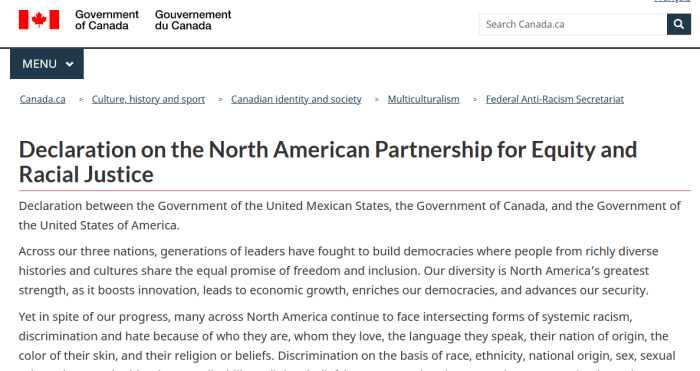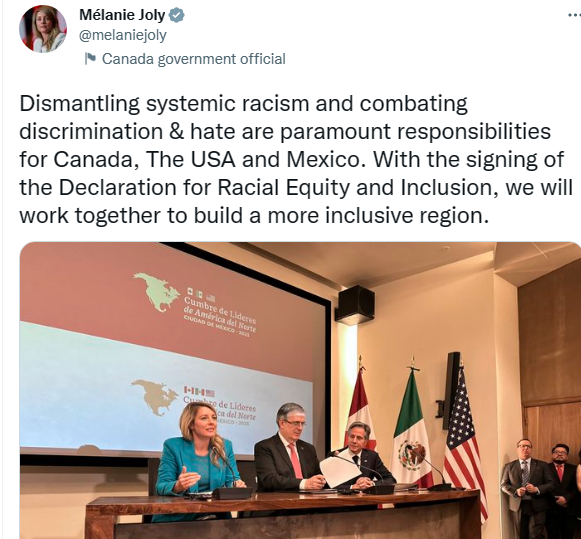

It’s the most harmless sounding names that are most chilling.
The Government of Canada has announced a new agreement with the United States and Mexico: The Declaration on the North American Partnership for Equity and Racial Justice. Mélanie Joly, Foreign Affairs Minister, also tweeted about it.
While this sounds fine enough, the vague wording of much of the text is cause for concern.
Considering the lengths that these countries have gone in establishing equal rights, it seems unproductive to keep pushing the narrative that there’s all these hate groups and institutions. It comes across as having the effect of making peaceful co-existence impossible, and maybe that’s the point.
It’s unclear what exactly “racial justice” would involve. If it were simply equal rights, then it would be very different to oppose. But would it be reparations? This idea has been floated in recent years. Perhaps it involves affirmative action or quotas in various institutions.
To address the obvious: this document doesn’t advocate for “equality”. That would be equal rights and opportunities between people. That would be fine. Instead, it calls for “equity”, which is equality of outcome, and sounds pretty much like Communism.
There’s a bit of a bait-and-switch here as the document calls on partners to: “root out the barriers to equal opportunity”. However, they are pushing equity (equality of outcome), while attempting to persuade others that it’s about equal opportunity.
Declaration between the Government of the United Mexican States, the Government of Canada, and the Government of the United States of America.
Across our three nations, generations of leaders have fought to build democracies where people from richly diverse histories and cultures share the equal promise of freedom and inclusion. Our diversity is North America’s greatest strength, as it boosts innovation, leads to economic growth, enriches our democracies, and advances our security.
Yet in spite of our progress, many across North America continue to face intersecting forms of systemic racism, discrimination and hate because of who they are, whom they love, the language they speak, their nation of origin, the color of their skin, and their religion or beliefs. Discrimination on the basis of race, ethnicity, national origin, sex, sexual orientation, gender identity, age, disability, religion, belief, language, and socio-economic status persist throughout our region and in each of our countries. Tribal Nations and Indigenous peoples, who have lived in North America since time immemorial, continue to face unacceptable disparities and barriers, as do other communities with lived experience of discrimination and racism. Systemic racism, expressions of white supremacy and discrimination in all forms diminish our economic growth, limit our prosperity, undermine national and regional security, and threaten the durability of our democracies. To unleash North America’s full and vast potential, we must comprehensively address these barriers and challenges.
Building on efforts in our respective countries to advance equity and racial justice, at the 2021 North American Leaders’ Summit President Andrés Manuel López Obrador, Prime Minister Justin Trudeau, and President Joseph R. Biden, Jr. declared their commitment to building just, inclusive, and equitable democracies that combat systemic racism and discrimination in all forms. Following that declaration, we committed to working together to create a North America in which every individual has an equal opportunity to achieve their full potential and equal participation in social, cultural, economic, and political life.
We now establish this North American Partnership as a reflection of our common commitments to advancing equity and racial justice within our countries, and our intent to work collaboratively to address systemic forms of discrimination and honor the diverse tapestry of histories, customs, cultures, languages, identities, ethnicities, abilities, and beliefs that make North America strong.
In recognition of our close ties and shared vision, the Participants in this Partnership will:
(1) Work within our own countries to affirmatively advance equity and racial justice, and to comprehensively root out the barriers to equal opportunity that marginalized communities continue to face.
(2) Establish a Trilateral Racial Equity and Inclusion Expert Network to facilitate the exchange of information to share best practices and innovative strategies developed across our three countries for advancing equity and racial justice in our public policies and societies, and to help identify further action areas for the Partnership. In establishing this expert exchange, we will seek opportunities to engage communities with lived experience of racism and discrimination on driving solutions to protect the rights of members of marginalized communities; advance health equity and economic inclusion; address racial and other disparities in the justice system, access to the ballot, and educational opportunities; and reflect the diversity of our nations in our federal public services workforce.
(3) Collaborate together to advance equity and racial justice through our participation in regional and multilateral organizations, such as the United Nations and other fora. This includes advancing the rights and aspirations enshrined in multilateral commitments, such as the UN Declaration on the Rights of Indigenous Peoples, the International Decade for People of African Descent, the UN Sustainable Development Goals, and other joint undertakings.
Discrimination against people “for who they love”, is presumably referring to adults of the same sex. However, it wouldn’t take much to expand that to include pedophilia, as the language is very vague. As for gender identity, many would agree that this has been forced on the public far too much already.
“Reflect[ing] the diversity of our nations in our federal public services workforce” is code for hiring quotas. Most people can agree that a merit-based civil service is the best way to have it. Social engineering shouldn’t push that principle aside
As for “address racial and other disparities in the justice system”, does this mean something like Gladue Rights across the continent? This would be race-based discounts in criminal court, due to overrepresentation of certain groups.
This agreement also endorses the United Nations Sustainable Development Agenda (Agenda 2030), and connects equity and racial justice to that.
The claim that certain groups “face unacceptable disparities and barriers” is telling, even if hard to understand. Disparities simply refers to differences in overall outcomes. This can be for many reasons, and is not necessarily discrimination. But it goes on imply that these differences are the direct result of some barriers that are put in place. This follows the assumption that groups of people would essentially be the same if others wouldn’t oppress them in some way.
An obvious example is the long debunked wage gap. Just because men and woman — on average — make different personal and lifestyle choices, doesn’t mean discrimination took place.
While the text sounds well meaning enough, domestic implementation of such ideals would invite even more Government overreach and interference.
And a logistical question: what would happen to people who decide that they want nothing to do with such a system? What punishments would they face?
(1) https://www.canada.ca/en/canadian-heritage/campaigns/federal-anti-racism-secretariat/declaration-partnership-equality-racial-justice.html
(2) https://twitter.com/melaniejoly/status/1612801847076749314
(3) https://www.state.gov/declaration-on-the-north-american-partnership-for-equity-and-racial-justice/
(4) https://www.state.gov/declaration-on-the-north-american-partnership-for-equity-and-racial-justice-2/

UGH! What a CRAZY document! So MANY vague terms… NOTHING is defined = recipe and justification for whatever we want! SCARY!
What can be objected to? The deliberately vaguely positive outcomes are carefully crafted so as to deflect any objections. These are the Fabian tactics adopted by communitarianism to further its agenda. It’s very successful because it adopts such disguises. It’s hard to oppose such apparently innocuous statements is it? It’s lethal!
This is how Communitarianism creeps into all aspects of daily lives. The vaguely meaningful language is crucial. Deliberately crafted so.
What’s to object to here?